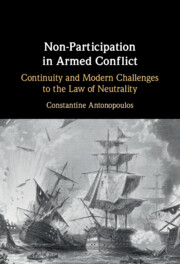Book contents
- Non-Participation in Armed Conflict
- Non-Participation in Armed Conflict
- Copyright page
- Dedication
- Contents
- Acknowledgements
- Table of Cases
- Table of Treaties
- Table of Documents
- Abbreviations
- Introduction
- 1 Is the Law of Neutrality Obsolete?
- 2 The United Nations’ Collective Security System and Neutrality
- 3 Rights and Duties under the Law of Neutrality
- 4 Neutrality and the Use of Force
- 5 Neutrality and Non-international Armed Conflict
- 6 Neutrality and Cyber Warfare
- 7 Conclusions
- Bibliography
- Index
6 - Neutrality and Cyber Warfare
Published online by Cambridge University Press: 24 February 2022
- Non-Participation in Armed Conflict
- Non-Participation in Armed Conflict
- Copyright page
- Dedication
- Contents
- Acknowledgements
- Table of Cases
- Table of Treaties
- Table of Documents
- Abbreviations
- Introduction
- 1 Is the Law of Neutrality Obsolete?
- 2 The United Nations’ Collective Security System and Neutrality
- 3 Rights and Duties under the Law of Neutrality
- 4 Neutrality and the Use of Force
- 5 Neutrality and Non-international Armed Conflict
- 6 Neutrality and Cyber Warfare
- 7 Conclusions
- Bibliography
- Index
Summary
Cyberspace may constitute either the exclusive area of operations or a means of conduct of hostilities in an otherwise conventional armed conflict. The basic text concerning the rules applicable in cyber warfare is the Tallinn Manual 2.0, a 'soft law' text that is not generally followed by the few States that include cyber warfare in their military manuals. However, the relevance and applicability of the law of neutrality in cyber conflict is not disputed. The proposed legal framework is in principle premised on the Hague Conventions V and XIII, though the particularities of cyberspace as a domain have admitted substantive deviations with respect to inviolability of neutral territory and neutral due diligence.
- Type
- Chapter
- Information
- Non-Participation in Armed ConflictContinuity and Modern Challenges to the Law of Neutrality, pp. 201 - 219Publisher: Cambridge University PressPrint publication year: 2022

